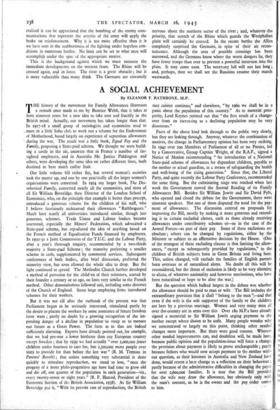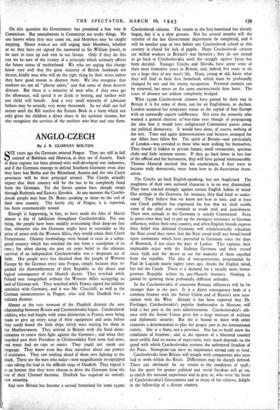A SOCIAL ACHIEVEMENT
By ELEANOR F. RATHBONE, M.P.
• Oilr little volume fell rather flat, but several women's societies took the matter up, and one by one practically all the larger women's organisations were converted. In 1924 My larger book, The Dis- inherited Family, converted nearly all the economists, and most of all Sir William Beveridge, then Director of the London School of Economics, who on the principle that example is better than precept, introduced - a generous scheme for the children of his staff, who I believe facetiously nicknamed their allowances " Rathboriuses." Much later nearly all universities introduced similar, though less generous, schemes. Trade Union and Labour leaders became interested, especially the Miners' Federation, which advocated-a State-paid scheme, but repudiated the idea of anything based on the French method of Equalisation Funds financed by employers. In 1930-31 a Joint Commission of the T.U.C. and the Labour Party, after a year's thorough enquiry, recommended by a two-thirds majority a State-paid Scheme ; the minority preferring a smaller scheme in cash, supplemented by communal services. Subsequent conferences of both bodies, after brief discussion, preferred the minority view, but soon allowed the whole idea to drop. But the light continued to spread. The Methodist Church further developed a Method of provision for the child-en of their ministers, started by their founder a century or so ago, on lines very similar to the French method. Other denominations followed suit, including some dioceses of the Church of England. Some large employing firms introduced schemes for their workers.
But it was not till after the outbreak of the present war that Parliament began to be seriously interested, stimulated partly by the desire to placate the workers by some assurance of future freedom from want ; partly no doubt by a growing recognition of the im- pending danger of a decline in population' so steep as to menace our future as a Great Power. The facts as to that are indeed sufficiently alarming. Experts have already pointed out, for example, that we had pre-war a lower birthrate than any European -country except Sweden ; that by 1939 we had actually "over 2,000,000 fewer children under fourteen to care for, but 2,soo,000 more people over sixty to provide for than before the last war" (R. M. Titmuss in Parents' Revolt); that unless something very substantial is done quickly to stimulate reproduction, we stand to lose, "once the progeny of a more philo-progenitive age have had time to grow old and die off, one quarter of the population in each generation—viz., every twenty-seven or eight years" (R. F. Hatted, President of the Economic Section of thz. British Association, 1938). As Sir William Beveridge put it, "With its present rate of reproduction, the British panic about the population of this country." As to material pros- perity, Lord Keynes pointed out that "the first result of a change- over from an increasing to a declining population may be very disastrous."
..Facts of the above kind leak through to the public very slowly, but they are leaking through. -Anyway, whatever the combination of motives, the change in Parliamentary opinion has been very striking. In 1942 over zoo Members of Parliament of all or no Parties, led by a Conservative, Group Captain Wright, of the RAF., signed a Notice of Motion reeommending "'he introduction' of a National State-paid scheme of allowances for dependent children,, payable to the mother or actual guardian, as a means of safeguarding the health and well-being of the rising generation." Since that, _the Liberal Party, and quite recently the Labour Party Conference, recommended the same thing. But the culminating stage was reached when last week the Government moved the Second Reading of its Family Allowances Bill. Besides Sir William Jowitt and Sir David.Fyfe, who opened and closed the debate for the Government, there were nineteen speakers. Not one of them disputed the need for the pay- ment of allowances. The discussion • centred on proposals for improving the Bill, mostly by making it more generous and extend- ing it to certain excluded classes, such as thcise already receiving allowances under contributory schemes or—as in the case of the Armed Forces—as part of their pay. Some of these exclusions are absolute ; others can be changed by regulations, either by the Minister or subject to an affirmative decision by the House. (One of the strangest of these excluding clauses is that limiting the allow- -ances,- " except as subsequently provided by regulations," to the children of British subjects born in Great Britain and living here. This, unless changed, will exclude the families of English parents born overseas or of naturalised aliens. No doubt all this will be reconsidered, but the threat of exclusion is likely to be very alarming to aliens, of whatever nationality and however meritorious, who have been naturalised or hope to be after the. war.) But the question which bulked largest in the debate was whether the allowance should be paid to man or wife. The Bill includes the extraordinary provision that it sfiall "belong to the man "—and that even if the wife is the sole supporter of the family or the children are hers by a previous marriage. Women and very many men all over the' country are in arms over this Over iSo M.P.s have already signed a memorial to Sir William Jowitt urging payment to the mother except where shown to be unfit. Many people wonder why we concentrated so largely on this point, thinking- other needed changes more important. But there were, good reasons. - Whereas other needed, improvements can, and doubtless will, be made later, because public opinion and the population-issue will force a change, the provision about payment is likely to prove unchangeable ; partlY because fathers who would now accept payment to the mother with- out question, as their kinsmen in Australia and New Zealand have done, would resent a later change as a reflection on their behaviour ; partly because of the administrative difficulties in changing the payee for over 2,600,000 families. It is true that the Bill 'provides that the wife may draw the allowance,' but obviously only with the man's consent, as he is the owner and the pay order comes to him.
On this question the Government has promised a free vote in Committee. But amendments in Committee are tricky things. No one knows when they may come on, and Members may be caught napping. Hence women are still urging their Members, whether or no they have yet signed the memorial to Sir William Jowitt, to be sure to turn up and vote in our favour. Only if they do this can we be sure of the victory of a principle which seriously affects the future status of motherhood. We who are urging this change know very well that the great majority of British husbands are decent, kindly men who will do the right thing by their wives unless they have good reason to distrust them. We also recognise that mothers are not all "plaster saints," and that some of them deserve distrust. But there is a minority of men who, if they once get the allowance, will spend it on drink or betting, and neither wife nor child will benefit. And a very small minority of 2,600,000 fathers may be actually very many thousands. So we shall not feel secure until the Bill reaches the Statute Book in a form which not only gives the children a direct share in the national income, but also recognises the services of the mothers who bear and rear them.



























 Previous page
Previous page